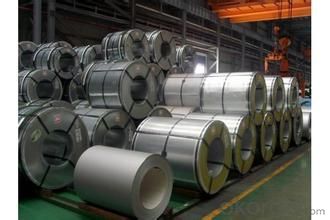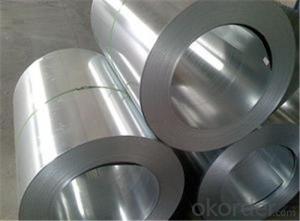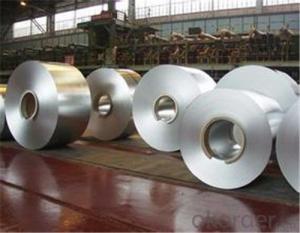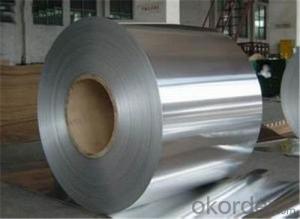Hot Galvanized/ Auzinc Steel -SGCC in China from CNBM
- Loading Port:
- Tianjin
- Payment Terms:
- TT or LC
- Min Order Qty:
- 100 m.t.
- Supply Capability:
- 5000000 m.t./month
OKorder Service Pledge
OKorder Financial Service
You Might Also Like
Description:
Hot-dip aluzinc steel sheet is substrated on cold rolled steel (CRC) in various strength and specification. Coating composition is 55% aluminum in weight ratio, 43.4% zinc, and 1.5% silicon, with excellent corrosion and heat resistance performance.
Specifications:
1.Mateials:SGCC,DX51D / DX52D /S250,280GD
2.Size:width:600-1250mm(900mm,1215mm,1250mm,1000mm the most common)
thickness:0.15-2.0mm
length:1000-6000mm,as your require
3.Zinc coating :60-180g( as required)
4.Coil id:508mm
5.Coil weight: 3-5MT(as required)
6. Surface:regular/mini/zero spangle, chromated, skin pass, dry etc.
Applications:
Galvalume Coil widely used for roofing products, It is also the ideal base material for Prepainted Steel Coil.
1. roofing
2. gutters
3. unexposed automotive parts
4. appliances
5. furniture
6. outdoor cabinetry
Images:

Production of cold formed corrugated sheets and profiles for roofing, cladding, decking, tiles, sandwich walls, rainwater protective systems, air conditioning duct as well as electrical appliances and engineering.
FAQ
1.What's your MOQ?
50MT, it is for one container.
2.Whether your company have QC teams?
Yeah, sure, our QC team is very important, they will keep the quality control for our products.
3. What's your normal delivery time?
Our delivery time about 10-20days for standard sizes, if you have other requirements like hardness and width ,it is about 20-40days.
- Q:How are steel coils used in the manufacturing of tubes?
- Steel coils are used in the manufacturing of tubes by being processed through a series of steps such as slitting, forming, and welding. These coils are slit into narrower strips, which are then formed into a cylindrical shape and welded together. This process allows for the efficient production of seamless or welded tubes, which can be used in various industries such as construction, automotive, and oil and gas.
- Q:What are the different types of steel coil slitting processes?
- There are several different types of steel coil slitting processes, each with its own benefits and considerations. Here are some of the most common types: 1. Rotary slitting: This is the most traditional and widely used slitting process. It involves a rotating circular blade that cuts through the coil. Rotary slitting is highly precise and can produce narrow strips, making it suitable for a wide range of applications. 2. Loop slitting: In this process, the coil is fed through a loop before being cut. Loop slitting allows for high-speed processing and can handle thicker materials. It is commonly used for heavy-duty applications and large coils. 3. Drag slitting: Also known as shear slitting, this process uses a stationary blade that pulls the material through to make the cut. Drag slitting is suitable for thinner materials and offers a high-quality edge finish. 4. Crush slitting: This process involves pressing the material between two rollers to make the cut. Crush slitting is commonly used for delicate materials that require a gentle cutting action. It can produce clean cuts and minimize burrs. 5. Laser slitting: As the name suggests, this process uses a laser beam to cut through the coil. Laser slitting offers high precision and can handle a wide range of materials. It is particularly useful for specialty steels and thin strips. Each type of steel coil slitting process has its own advantages and limitations, so it's important to consider factors such as material thickness, coil size, and required strip width when choosing the appropriate method. Additionally, factors like cost, speed, and edge finish should also be taken into account to determine the best process for a specific application.
- Q:what is the differance between ceramic and stainless steel headers and 4-2-1 and 4-1 and which are better for racing and should i get ceramic or stainless steel headers???? for a 98 civic
- 4 into 2 into 1 is the style that the pipe finally necks down to one pipe. 4 into 1 is more restrictive but you wont really notice. Ceramic costs alot more but is better at keeping the high temps safe and wont warp or discolor, rust like other pipes, they are for more performance oriented vehicles. Stainless will do the job though for the average tuner.
- Q:I'm a Hobbyist and want to Build my own axial-flow jet engine,can I use steel as the Turbine blades instead of Titanium which I can't get easily?? What about the other parts I can use for...?!
- Jet gasoline definitely does get warm sufficient to soften the engines (the cores of that are created from titanium alloy, not steel). in actuality, jet engines could be in particular designed as a fashion to not soften below popular working situations. As for the engines vaporizing it incredibly is extremely not likely. They probable have been pulverized via the impact forces and the debris then melted interior the hearth.
- Q:How do steel coils contribute to the manufacturing of construction materials?
- Steel coils play a crucial role in the manufacturing of construction materials by providing a versatile and reliable source of raw material. These coils are manufactured from high-quality steel and are typically used as a primary input in various construction processes. One of the main contributions of steel coils in construction material manufacturing is their ability to be shaped and formed into different products. These coils can be easily cut, bent, and molded to create a wide range of construction materials such as beams, pipes, and sheets. This versatility allows manufacturers to produce customized construction components that meet specific project requirements. Furthermore, steel coils provide strength and durability to construction materials. Steel is known for its exceptional tensile strength, which makes it an ideal choice for load-bearing structures and components. By using steel coils, manufacturers can produce construction materials that can withstand heavy loads, extreme weather conditions, and other environmental factors, ensuring the longevity and safety of the final construction product. In addition, steel coils offer consistency in quality and performance. The manufacturing process of steel coils involves stringent quality control measures, ensuring that the final product meets the required specifications. This consistency in quality gives construction material manufacturers the confidence to produce reliable and high-performance products consistently. Steel coils also contribute to the efficiency of construction material manufacturing. The availability of steel coils in large quantities and standardized dimensions allows for streamlined production processes. Manufacturers can optimize their operations by utilizing automated machinery and processes, reducing production time and costs, and increasing overall efficiency. Overall, steel coils are an essential component in the manufacturing of construction materials. Their versatility, strength, consistency, and efficiency make them a preferred choice for construction material manufacturers. By using steel coils, manufacturers can create high-quality and reliable construction materials that contribute to the safety, durability, and aesthetics of various construction projects.
- Q:which elements are alloyed to make stainless steel?A Fe, CB Fe, MnC Fe, NiD Fe, CrE Fe, Cr, Ni
- E. Stainless steel is mainly comprised of Cr and Ni. Steel is an alloy composed mainly of iron. On a side note, Carbon is not really in stainless steel and it is only less than .1%
- Q:What are the different types of steel coil surface finishes?
- There are several different types of steel coil surface finishes available, each with its own unique characteristics and applications. Some of the most common types include: 1. Hot rolled: This finish is achieved by rolling the steel at a high temperature, which results in a rough and textured surface. Hot rolled steel coils are commonly used in applications where aesthetics are not a priority, such as structural or industrial projects. 2. Cold rolled: In contrast to hot rolled steel, cold rolled steel coils are processed at lower temperatures, resulting in a smoother and more refined surface. This finish is ideal for applications where a clean and polished appearance is desired, such as automotive parts, appliances, and furniture. 3. Galvanized: Galvanized steel coils are coated with a layer of zinc to protect them from corrosion. This finish provides excellent resistance to rust and can be used in a variety of outdoor applications, including roofing, fencing, and signage. 4. Stainless steel: Stainless steel coils have a unique finish that is resistant to corrosion, staining, and rust. This makes them highly versatile and suitable for a wide range of applications, including kitchen appliances, medical equipment, and architectural projects. 5. Coated: Coated steel coils are treated with a protective layer of paint or other coatings to enhance their durability and aesthetic appeal. This finish is commonly used in the construction industry for applications such as roofing, siding, and garage doors. 6. Pre-painted: Pre-painted steel coils are coated with a layer of paint or resin before they are formed into the final product. This finish offers a wide range of colors and finishes, making it popular for applications such as building cladding, appliances, and automotive parts. Overall, the choice of steel coil surface finish depends on the specific requirements of the project, including aesthetics, corrosion resistance, and durability. Each finish has its own advantages and disadvantages, and it is important to consider these factors when selecting the appropriate type of steel coil surface finish for a particular application.
- Q:What are the quality standards for steel coil manufacturing?
- The quality standards for steel coil manufacturing typically include criteria such as dimensional accuracy, surface finish, mechanical properties, chemical composition, and adherence to industry-specific standards like ASTM or EN. These standards ensure that the steel coils meet the required specifications for various applications and provide reliable performance in terms of strength, durability, and consistency. Additionally, manufacturers often follow strict quality control processes throughout the production cycle to ensure the quality of the final product.
- Q:my step father bought a big steel drum grill it has steel sheets (very thin) that go inbetween the flame and the food (closer to the flame) with that there the food will not cook, it does not get hot enough????? please help... what should we do
- This type of grill cooks like an oven You have to keep the lid shut until the proper temp. is reached. Then place you meats and stuff on the grill and close the lid. Open the lid infrequently to keep the heat in. If its charcoal make sure you use enough charcoal the first time so you don't have to add any while you food is cooking.
- Q:What are the different methods of edge trimming for steel coils?
- There are several different methods of edge trimming for steel coils, including slitting, shearing, and laser cutting. Slitting involves cutting the coil into narrower strips using circular blades. Shearing involves cutting the edges of the coil using a straight blade. Laser cutting uses a high-powered laser to precisely trim the edges of the coil.
1. Manufacturer Overview |
|
|---|---|
| Location | |
| Year Established | |
| Annual Output Value | |
| Main Markets | |
| Company Certifications | |
2. Manufacturer Certificates |
|
|---|---|
| a) Certification Name | |
| Range | |
| Reference | |
| Validity Period | |
3. Manufacturer Capability |
|
|---|---|
| a)Trade Capacity | |
| Nearest Port | |
| Export Percentage | |
| No.of Employees in Trade Department | |
| Language Spoken: | |
| b)Factory Information | |
| Factory Size: | |
| No. of Production Lines | |
| Contract Manufacturing | |
| Product Price Range | |
Send your message to us
Hot Galvanized/ Auzinc Steel -SGCC in China from CNBM
- Loading Port:
- Tianjin
- Payment Terms:
- TT or LC
- Min Order Qty:
- 100 m.t.
- Supply Capability:
- 5000000 m.t./month
OKorder Service Pledge
OKorder Financial Service
Similar products
New products
Hot products
Related keywords




























